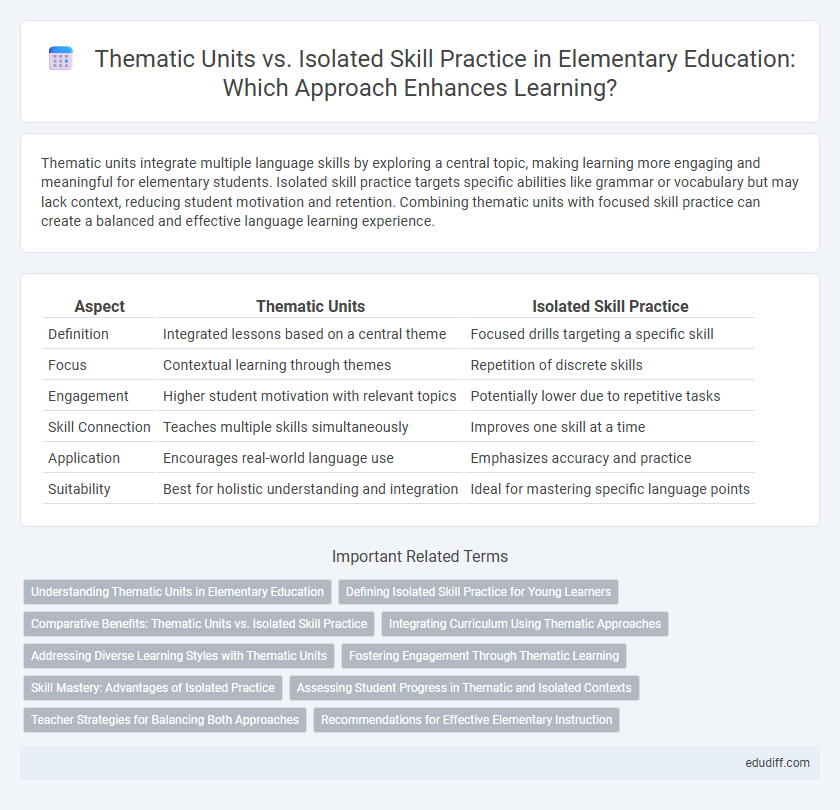Thematic units integrate multiple language skills by exploring a central topic, making learning more engaging and meaningful for elementary students. Isolated skill practice targets specific abilities like grammar or vocabulary but may lack context, reducing student motivation and retention. Combining thematic units with focused skill practice can create a balanced and effective language learning experience.
Table of Comparison
| Aspect | Thematic Units | Isolated Skill Practice |
|---|---|---|
| Definition | Integrated lessons based on a central theme | Focused drills targeting a specific skill |
| Focus | Contextual learning through themes | Repetition of discrete skills |
| Engagement | Higher student motivation with relevant topics | Potentially lower due to repetitive tasks |
| Skill Connection | Teaches multiple skills simultaneously | Improves one skill at a time |
| Application | Encourages real-world language use | Emphasizes accuracy and practice |
| Suitability | Best for holistic understanding and integration | Ideal for mastering specific language points |
Understanding Thematic Units in Elementary Education
Thematic units in elementary education integrate multiple subjects around a central theme, enhancing student engagement and deeper understanding by connecting concepts across disciplines such as science, literacy, and social studies. This approach promotes critical thinking and real-world application, contrasting with isolated skill practice that often focuses on repetitive, single-skill mastery without contextual relevance. Research indicates thematic units improve knowledge retention and foster a more holistic learning experience for young learners.
Defining Isolated Skill Practice for Young Learners
Isolated Skill Practice for young learners targets specific abilities such as phonics, handwriting, or number recognition through repetitive exercises. This method emphasizes mastery of individual skills without integrating broader content or themes, allowing focused skill development. It supports foundational learning by reinforcing discrete tasks essential for reading, writing, and math proficiency.
Comparative Benefits: Thematic Units vs. Isolated Skill Practice
Thematic units promote deeper comprehension by integrating multiple skills around a central theme, enhancing student engagement and meaningful connections. Isolated skill practice targets specific abilities, allowing focused repetition but may limit contextual understanding and application. Combining thematic units with skill practice can balance broad conceptual learning and precise skill development in elementary education.
Integrating Curriculum Using Thematic Approaches
Integrating curriculum through thematic units enhances student engagement by connecting multiple subjects around a central theme, promoting deeper understanding and retention. Thematic units encourage the application of skills in meaningful contexts, unlike isolated skill practice, which often fragments learning and limits real-world relevance. This approach fosters interdisciplinary learning, critical thinking, and holistic development, aligning elementary education with cognitive and social growth principles.
Addressing Diverse Learning Styles with Thematic Units
Thematic units engage diverse learning styles by integrating multiple subjects around a central theme, promoting deeper understanding and retention. This approach supports visual, auditory, and kinesthetic learners through varied activities such as storytelling, hands-on projects, and group discussions. Isolated skill practice often limits interaction to a single mode, whereas thematic units foster comprehensive, multi-sensory learning experiences.
Fostering Engagement Through Thematic Learning
Thematic units integrate multiple subject areas around a central theme, creating meaningful connections that enhance student engagement and motivation. This approach encourages deeper understanding by allowing students to apply skills in varied, real-world contexts rather than isolated drills. Research shows that thematic learning boosts retention and enthusiasm by making content relevant and stimulating creativity.
Skill Mastery: Advantages of Isolated Practice
Isolated skill practice enhances elementary students' mastery by allowing focused repetition on specific language components like phonics, grammar, or vocabulary. This targeted approach builds strong foundational skills, leading to improved accuracy and confidence before integrating them into broader thematic units. Research shows isolated practice accelerates skill acquisition and consolidates learning through clear, measurable objectives.
Assessing Student Progress in Thematic and Isolated Contexts
Assessing student progress in thematic units involves evaluating integrated skills through real-world contexts, providing a comprehensive view of understanding and application. In contrast, isolated skill practice assessments focus on specific abilities, allowing targeted measurement of particular competencies. Combining both approaches offers a balanced insight into student learning, informing instruction and supporting skill development in elementary education.
Teacher Strategies for Balancing Both Approaches
Effective teacher strategies for balancing thematic units and isolated skill practice involve integrating skills within meaningful content to enhance student engagement and retention while dedicating focused time to reinforce specific competencies such as phonics or math facts. Employing formative assessments allows educators to identify skill gaps and tailor isolated practice sessions without disrupting thematic coherence. Blending collaborative projects and targeted drills supports comprehensive learning, promoting both contextual understanding and skill mastery in elementary classrooms.
Recommendations for Effective Elementary Instruction
Effective elementary instruction emphasizes integrating thematic units that connect various subjects around central themes, enhancing student engagement and comprehension. Isolated skill practice should be strategically incorporated to reinforce specific competencies but not dominate instructional time. Combining both approaches with a balanced focus on meaningful content and targeted skill development optimizes learning outcomes for young students.
Thematic Units vs Isolated Skill Practice Infographic

 edudiff.com
edudiff.com